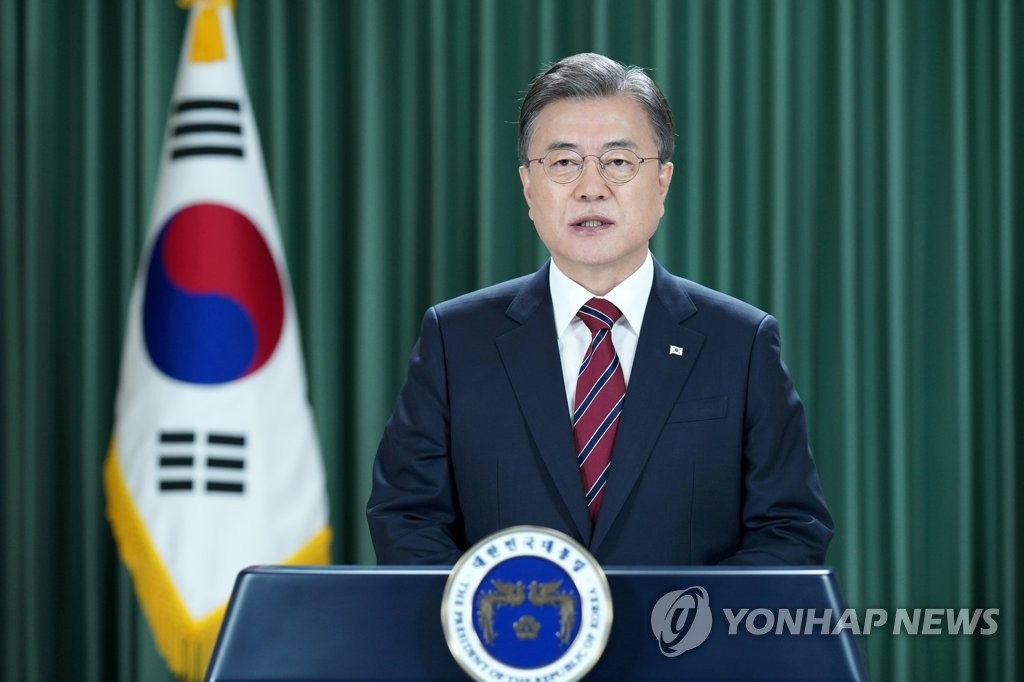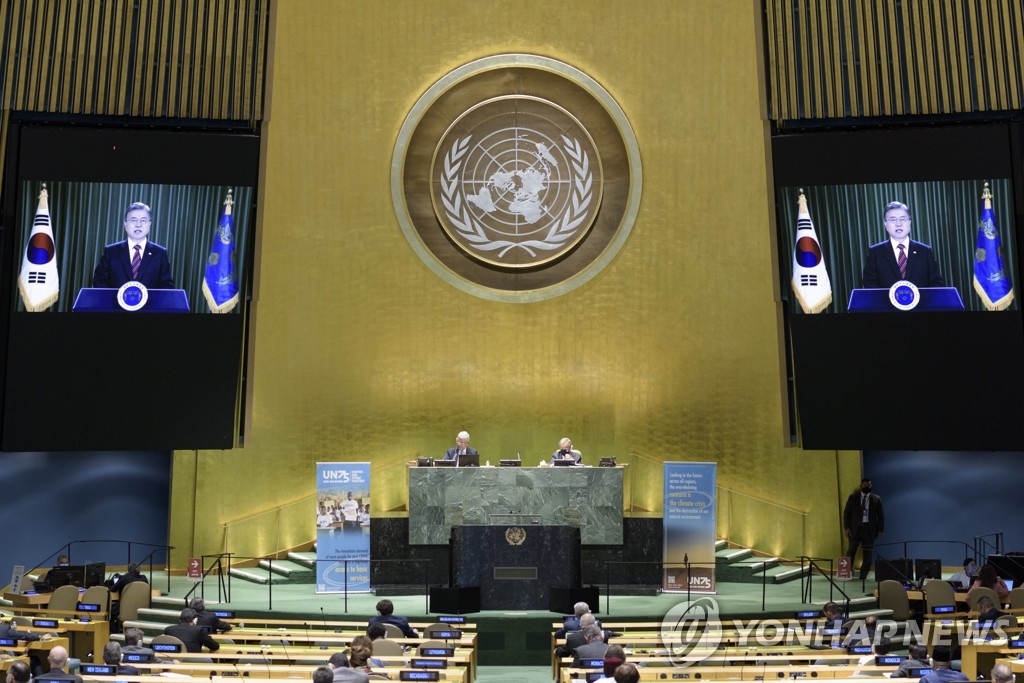- California Assembly OKs highest minimum wage in nation
- S. Korea unveils first graphic cigarette warnings
- US joins with South Korea, Japan in bid to deter North Korea
- LPGA golfer Chun In-gee finally back in action
- S. Korea won’t be top seed in final World Cup qualification round
- US men’s soccer misses 2nd straight Olympics
- US back on track in qualifying with 4-0 win over Guatemala
- High-intensity workout injuries spawn cottage industry
- CDC expands range of Zika mosquitoes into parts of Northeast
- Who knew? ‘The Walking Dead’ is helping families connect
Moon proposes declaring end to Korean War, requests U.N.’s support
South Korean President Moon Jae-in restated a call Wednesday for the declaration of an end to the Korean War, saying it would pave the way for complete denuclearization and lasting peace on the peninsula, as he took part in the annual United Nations General Assembly session via video links.
He requested the international community’s support so that the Koreas can advance into an era of reconciliation and prosperity through the end-of-war declaration.
This year marks the 70th anniversary of the outbreak of the war, which ended in 1953 in an armistice, not a peace treaty.
“Time has come to remove the tragedy lingering on the Korean Peninsula. The war must end, completely and for good,” Moon said in his pre-recorded video speech submitted to the 75th session of U.N. General Assembly. It was live-streamed on early Wednesday (Seoul time).


South Korean President Moon Jae-in delivers a video speech during the High-Level Meeting to Commemorate the 75th Anniversary of the United Nations on Sept. 21, 2020, in this photo provided by Cheong Wa Dae in Seoul. (PHOTO NOT FOR SALE) (Yonhap)
Moon’s offer is seen as aimed at revitalizing the Korea peace process, which has lost steam since U.S. President Donald Trump and North Korean leader Kim Jong-un failed to produce a deal in their Hanoi summit early last year. Inter-Korean relations have been in deadlock despite a series of summit talks between Moon and Kim in 2018.
“Peace on the Korean Peninsula is still in the making and changes that used to brim with hopes have stalled,” Moon said. He stressed the significance of peace on the peninsula, saying it will guarantee peace in Northeast Asia and bring positive changes to the world order.
“I believe it begins with declaring an end to the war, an act that can affirm mutual commitments to peace,” he said. “The end-of-war declaration will, indeed, open the door to complete denuclearization and permanent peace regime on the Korean Peninsula.”
Korea is the region in most urgent need of the spirit of the U.N. to realize world peace, he added.
It is not the first time that Moon, widely known for his Korea peace initiative, has proposed the end-of-war declaration on the global stage. He emphasized the urgency of declaring a formal end to the war during his 2018 address at the 73rd session of the U.N. General Assembly.
The Moon administration has touted an end-of-war declaration as a starting point for the full-fledged Korea peace process.
Moon expressed hope for a possible breakthrough from a response to the COVID-19 pandemic.
“Inter-Korean cooperation in disease prevention and control and public health will also trigger dialogue and cooperation in the process of building a peaceful Korean Peninsula,” he said.
Moon also suggested that the international community views the Korean Peninsula issues via the “lens of more inclusive international cooperation.”
In that regard, he proposed launching a Northeast Asia Cooperation Initiative for Infectious Disease Control and Public Health, whereby North Korea participates as a member along with China, Japan, Mongolia and South Korea.
“A cooperative architecture that guarantees collective protection of life and safety will lay the groundwork for North Korea to have its security guaranteed by engaging with the international community,” the president said.
Reiterating the offer of declaring a formal end to the Korean War at the U.N. event, Moon stopped short of providing details, including whether a related U.N. resolution is necessary and if China would get involved in any declaration.
Pyongyang has been unresponsive to Moon’s earlier overtures that the two Koreas cooperate in the coronavirus response and health care sector.
John Bolton, a former White House national security adviser, wrote in his recent memoir that, “The North had told us they didn’t care about (the end-of-war declaration), seeing it as something Moon wanted.”
The North is apparently seeking concrete security guarantees, beyond proclaiming an end to the war that is viewed by many as largely symbolic, before taking substantive denuclearization steps.
Moon’s security aides say such a declaration would be highly meaningful as a potential catalyst for inter-Korean peace and denuclearization.











